Adopt a Goldendoodle for a Fun-Filled Home Life
Add more joy to your life by adopting a hypoallergenic Goldendoodle! Our website is dedicated to helping you rescue or adopt this loving and social breed. Explore our resources and information to discover how a Goldendoodle can enrich your life!
Adopt Goldendoodle Puppies & Dogs
Make your home life brighter and more fun when you rescue and welcome a Goldendoodle! This designer breed between a Poodle and Golden Retriever is the best choice for allergic owners who want friendly and affectionate pooches. Their hypoallergenic coats are a perfect adaption for individuals with allergies. They are highly sociable and make for excellent lifelong companions. Adopt or rescue a Goldendoodle and see how they can change your life!
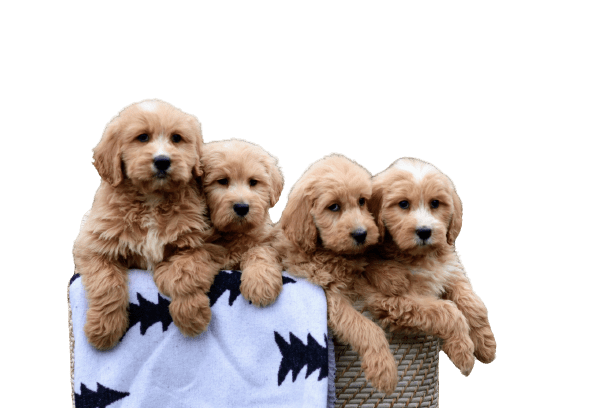
Find a Goldendoodle by Location
Goldendoodle General Info
Goldendoodle Types
As a hybrid, the Goldendoodle is categorized by different generations. The F1 Goldendoodle is the offspring of purebred Poodle and Goldendoodle. They typically have shaggy and curly coats.The F1B is the crossbreed of a Poodle and F1 Goldendoodle, offering more color variations and is the most hypoallergenic type.
The F2 Goldendoodle indicates a second-generation offspring, meaning that the parents are both F1. They have pretty similar characteristics to their F1 parents. Lastly, the F2B Goldendoodle, or multigenerational doodles, is a crossbreed between an F1B Goldendoodle and an F1 Goldendoodle and is generally healthy and non-shedding.
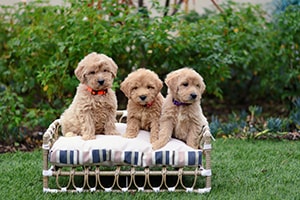
Goldendoodle Breeds
- English Goldendoodle- a mix of Poodle and English Golden Retriever
- Double Doodles- a two-generation blend of Goldendoodle and Labradoodle
- Petite Goldendoodle- a mix between miniature Poodle sire and Golden Retriever and Cavalier
- Teddy Bear Goldendoodle- wide, teddy bear-like faced English Golden retriever and Poodle
Goldendoodle Height & Weight
These dogs are of medium size and usually weight around 24 to 32 lbs. Their height varies from 13 to 16 inches.
Goldendoodle Lifespan
The healthy Goldendoodles’ lifespan can be anywhere between 10 to 15 years. Several factors affect their lifespan, including health and the external environment. Yet you can help your Goldendoodles live longer with proper caring.
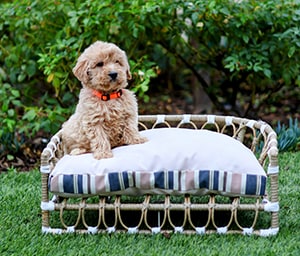
Goldendoodle Appearance
Goldendoodle Colors
The Goldendoodleis commonly golden butmaycome inapricot, red, and cream shades thanks to their Golden Retriever lineage. They could also have the Poodle black, dark brown, or gray and silver coloring. Also, they can boast different color patterns due to their heritage.
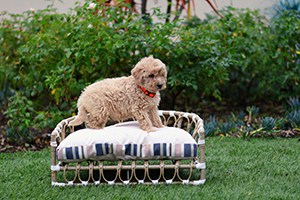
Do Goldendoodles Shed?
The Goldendoodles are considered a light- to non-shedder. Certain types like the F1B are considered the most hypoallergenic generation and would fit allergic owners best.
Goldendoodle Grooming
This hybrid could have a loosely curled coat like its Poodle heritage or a thick coat like the Golden Retriever.Either way, Goldendoodles need a good brushing to maintain a healthy coat and a trim every 8-12 weeks.
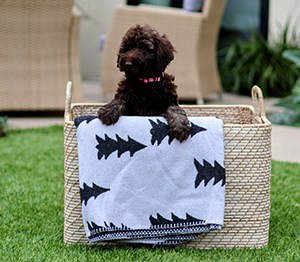
Goldendoodle Personality, Temperament, and Training
Are Goldendoodles Easy to Train?
The Goldendoodle’s highly sociable trait makes them easy to train even for first-time or wary owners. They are intelligent and sensitive, making it simple for you to hold their attention. Patience and consistency while teaching them are keys to successful training!
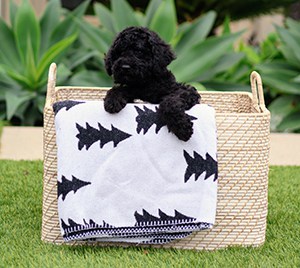
Are Goldendoodles Good with Kids?
As gentle and sweet dogs, the Goldendoodle isan excellent family companion, especially for kids. When they start bonding at an early age, they form deep connections with their humans and stay loyal for life. Some types are also hypoallergenic, which fits kids with allergies.
How are Goldendoodles with Elderly People?
Goldendoodles are among the best breeds for seniors. They are charming and devoted to their owner. However, they may require more exercise but nothing heavy that the elderly can’t handle—leisurely walks do well for this pooch and the senior, too!
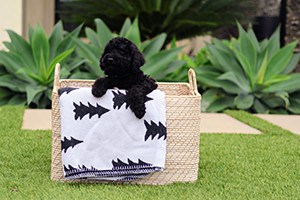
Are They Good with Cats?
As easygoing dogs, Goldendoodles are often known to have a low prey drive. They can become fast friends not only with children but also with cats with the proper training techniques. How they are introduced and their respective personalities determine how their relationship plays out.
Can You Take Your Goldendoodles to Work?
Goldendoodles don’t like to be left alone at home, but can they behave enough for you to take them to your workplace? As intelligent and friendly dogs, they typically react well to different environments. They love to have fun, so keeping their energy in check is a concern.
Fun Activities Your Goldendoodle Will Love!
Whether you are cozying up or out at the park, your Goldendoodle loves to spend time with you. You can take them on hikes or play dog frisbee and other playtime activities fit for their size. They also love the water, so don’t forget to take them out for a swim!

Goldendoodle Health
Do Goldendoodles Have a Lot of Health Problems?
The Goldendoodle is a healthy designer breed in general, but that does not mean that they are not susceptible to health problems. Their lifespan can be affected by certain conditions that are also observed with Golden Retrievers and Poodles. Here’re some Goldendoodle health issues you need to learn to maintain good health of your pooch.

Hip Dysplasia
This condition is inherited and, at times, brought about by malnutrition. Hip Dysplasia is the result of the thighbone not snugly fitting the hip joint. It is characterized by limping and outward display of discomfort. They may also suffer from lameness on both or one rear leg.
Patellar Luxation
The patellar luxation or slipped stifles is a typical problem for smaller dogs. It is known as the dislocation of the knee joint, which causes pain to the canine. It can be a crippling condition, but many dogs can still live generally despite it.

Elbow Dysplasia
A degenerative condition, elbow dysplasia, is like hip dysplasia in that it results in a weakened or malformed elbow. It could cause the dog to become lame and may develop arthritis. This condition can be corrected with surgery, weight management, and medication.
Von Willebrand’s Disease
Von Willebrand’s disease is a type of blood disorder found in humans and dogs. Some symptoms include bleeding gums, nosebleeds, prolonged bleeding during heat cycles or whelping, and bloody stool. It can’t be cured but is managed with transfusions and evasion of certain medications.
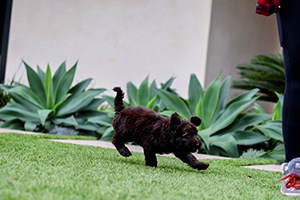
Progressive Retinal Atrophy (PRA)
The PRA or Progressive Retinal Atrophy is characterized by the gradual deterioration of the dog’s retina. They may become night blind, which means they lose their sight during the daytime. Many dogs adapt to vision loss if the surrounding stays the same.
Hypothyroidism
A thyroid gland disorder, Hypothyroidism, is said to cause epilepsy, hair loss, or alopecia. It could also result in lethargy, obesity, hyperpigmentation, and other skin-related issues. This condition can be treated by balancing their diet and medication.
Gastric Dilatation-Volvulus
GDV or Gastric Dilatation-Volvulus is a life-threatening health issue when the stomach is bloated or distended with air or gas, causing twists. They are unable to vomit due to this condition, impeding circulation. Common symptoms are restlessness, lethargy, depression, weakness, and increased heart rate.
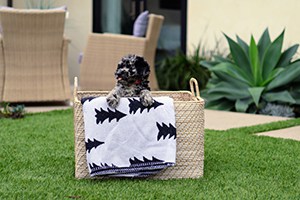
Drop Us A Line
Please fill out the form below if you have any questions or would like more information. We will get back to you as soon as possible. Thank you for your interest.